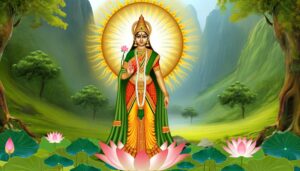Meaning of the Name Manu
The name 'Manu' originates from ancient Sanskrit, deriving from the root word 'man,' which means 'to think.' In Hindu mythology, Manu is considered the progenitor of humanity and a key figure in the cosmic cycle, embodying wisdom, leadership, and moral integrity. This name symbolizes intellect and responsibility, emphasizing its universal appeal.
Intriguingly, 'Manu' manifests in various forms across different languages, such as a diminutive of Immanuel in Finnish or symbolizing 'hand' in Latin. Its historical significance and cultural resonance have endowed it with an enduring presence.
To uncover more layers of its rich heritage, we explore Manu's diverse cultural impact.

Key Takeaways
- Manu originates from ancient Sanskrit, meaning 'to think.'
- In Hindu mythology, Manu is the progenitor of humanity and a lawgiver.
- The name symbolizes intellect, consciousness, wisdom, and moral integrity.
- Manu has linguistic variations across cultures, highlighting its universal appeal.
- Famous personalities like Manu Ginóbili and Manu Chao showcase the name's global impact.
Etymological Roots
The name 'Manu' originates from ancient Sanskrit, where it is associated with the root word 'man,' meaning 'to think.' This etymological connection underscores the emphasis on intellect and consciousness inherent in the name.
Sanskrit, an Indo-European language that has profoundly influenced many modern languages, lends a historical depth to 'Manu.' The term 'man' itself shares roots with the English word 'man,' highlighting the universal nature of thought and cognition.
Intriguingly, 'Manu' also conveys notions of humanity and the archetypal human being in various linguistic traditions. Recognizing these origins provides a richer understanding of the name's significance, illustrating how language and thought are interwoven across cultures and epochs.
Therefore, 'Manu' encapsulates a legacy of intellectual tradition and human essence.
Manu in Hindu Mythology
In Hindu mythology, Manu is heralded as the progenitor of humanity, whose name originates from the Sanskrit root 'man,' meaning 'to think.' According to ancient texts, Manu is pivotal in the cosmic cycle, often regarded as both the first man and the lawgiver who set the foundation for societal norms.
His role in creation is exemplified in the scriptures, where he is entrusted with the preservation and propagation of human life following a great deluge.
Mythical Origins of Manu
Tracing its roots to ancient Vedic texts, the name Manu holds significant prominence in Hindu mythology as the progenitor of mankind and the archetypal lawgiver.
The term 'Manu' derives from the Sanskrit word 'man,' meaning 'to think,' reflecting the profound intellect attributed to this figure.
As detailed in the Manusmriti and Puranas, Manu is often regarded as the first man created by Brahma, the cosmic architect.
Revered as the original teacher of sacred laws and moral codes, Manu's narrative underscores the essential link between divine instruction and human civilization.
His mythical origins emphasize his role as a guiding force in the establishment of societal norms, encapsulating timeless principles that continue to resonate within the spiritual and cultural fabric of Hinduism.
Manu's Role in Creation
Building upon his esteemed origins as the progenitor of mankind, Manu's role in creation encompasses his pivotal contributions to the cosmic order in Hindu mythology. Manu is often depicted as the first human, entrusted by the gods to establish the principles governing human existence.
His role in creation can be summarized through several key responsibilities:
- Lawgiver: Manu is credited with composing the Manusmriti, an ancient legal text outlining dharma (moral duty) and social laws.
- Protector: He safeguarded humanity during the great deluge, akin to the biblical Noah.
- Progenitor: As the forefather, he repopulated the earth with human beings after the flood.
- Cosmic Order: Manu's teachings and laws provided structure and coherence to social and cosmic hierarchies.
These roles underscore Manu's significance in shaping the Hindu mythological and societal framework.
Cultural Significance
The cultural significance of the name Manu is deeply rooted in its frequent references within ancient texts, reflecting its importance across various traditions.
This name, while originating in Hindu mythology, has found usage globally, transcending cultural boundaries.
Moreover, the symbolic meanings associated with Manu underscore its enduring emblematic value in both historical and contemporary contexts.
Ancient Texts Reference
In ancient texts, the name Manu holds profound cultural significance, often associated with the progenitor of humanity and a figure of divine authority in Hindu mythology. Rooted in Sanskrit, Manu translates to 'man' or 'human,' encapsulating the essence of mankind itself.
The Vedic scriptures and epics like the Mahabharata and the Manusmriti elaborate his roles and narratives. These texts highlight Manu's significance through:
- Creation: Manu is depicted as the first human, created by the gods.
- Lawgiver: Authorship of the Manusmriti, a foundational legal text in Hindu tradition.
- Preserver: Known for guiding humanity through catastrophic events, including a great flood.
- Progenitor: Regarded as the ancestor of all human beings.
This etymological and historical context underscores Manu's enduring legacy.
Global Name Usage
How has the name Manu transcended its ancient origins to find relevance in various cultures around the world?
Initially rooted in ancient Sanskrit texts, the name Manu signifies the progenitor of humanity in Hindu mythology. Over centuries, it has permeated diverse cultures, reflecting a universal appeal.
In Polynesian culture, Manu denotes a bird, symbolizing freedom and navigation.
Within African contexts, particularly in Ghana, Manu is a common surname, often associated with the Akan people.
In Finland, Manu serves as a diminutive for the name Immanuel, infusing it with Christian theological resonances.
This cross-cultural adoption underscores the name's linguistic adaptability and historical depth, demonstrating its enduring global significance beyond its original mythological framework.
Symbolic Meanings Explored
Manu's symbolic resonance across cultures illuminates its multifaceted significance, ranging from divinity and ancestry in Hinduism to freedom and navigation in Polynesian traditions.
The name Manu emerges from the Sanskrit root 'man,' meaning 'to think,' which underscores its association with intellect and wisdom.
Historically, Manu is revered as the progenitor of humanity and the author of ancient legal texts in Hindu mythology.
In Polynesian culture, Manu denotes a bird, symbolizing liberation and exploration.
To encapsulate Manu's cultural significance:
- Hinduism: Represents the first man and lawgiver.
- Polynesian Traditions: Embodies freedom and discovery.
- Etymology: Derived from Sanskrit, connoting thought and intellect.
- Historical Texts: Features prominently in ancient scriptures.
Understanding Manu offers insights into the diverse ways cultures perceive existential and philosophical ideals.
Symbolism and Traits
Rooted in ancient civilizations, the name Manu evokes profound symbolism and embodies a range of traits that have transcended generations. Historically, Manu is often linked to the Sanskrit term 'man,' meaning 'to think,' thereby symbolizing intellect and consciousness.
In Hindu mythology, Manu is revered as the progenitor of humanity, akin to Adam in Abrahamic traditions. This association imbues the name with connotations of wisdom, leadership, and moral integrity. Traits commonly attributed to those named Manu include a strong sense of responsibility, ethical fortitude, and an innate ability to guide and protect.
These characteristics are not merely historical artifacts but continue to resonate, reflecting the enduring legacy of the name across various cultures and epochs.
Manu in Different Languages
The name Manu, transcending its Sanskrit origins, manifests in various forms across different languages, each adaptation reflecting unique cultural and linguistic nuances. In Sanskrit, Manu signifies the progenitor of humanity, a profound cultural emblem.
Examining its iterations across linguistic spectra reveals:
- Latin: Manu translates to 'hand,' showcasing an entirely different semantic field.
- Finnish: In Finland, Manu is a diminutive of the name Immanuel, imbuing it with religious significance.
- German: The German interpretation retains the integrity of its Sanskrit roots, symbolizing human origin.
- Malay: In Malay, the name Manu often appears in folklore, further rooting it in mythological contexts.
Each linguistic variation underscores the name's vast adaptability and its resonance with diverse cultural identities.
Modern Usage
In contemporary settings, the name Manu continues to be embraced globally, maintaining its relevance through its diverse cultural and linguistic connotations. The name, rooted in ancient Sanskrit, is cherished in various countries, often symbolizing humanity’s archetypal ancestor or embodying qualities of wisdom and leadership. Its phonetic simplicity enables seamless integration across languages, enhancing its universal appeal. The popularity of the name Manu also reflects the interconnectedness of global communities, as individuals from different backgrounds and traditions find common ground in their choice of this timeless name. Its origins dating back to Hindu mythology further underpin its enduring allure, transcending geographical and cultural boundaries. In a similar vein, the origin of the name Callen can be traced back to Celtic origins, often associated with meanings of “power” or “rock. ” This exemplifies how names, like Manu and Callen, can carry rich histories and significance across diverse cultural landscapes.
The table below illustrates the modern usage of the name Manu in different cultural contexts:
| Region | Cultural Significance | Common Usage |
|---|---|---|
| India | Mythological, Literary | Personal Name |
| Finland | Short form of names like Manuel | Personal Name |
| Polynesia | Connotes strength and nobility | Personal Name |
Thus, Manu remains a timeless name, traversing cultural boundaries.
Famous Personalities Named Manu
Prominent individuals bearing the name Manu have made significant contributions across various fields, from sports to literature, reflecting the name's enduring legacy.
- Manu Ginóbili: An Argentine professional basketball player, Ginóbili is celebrated for his illustrious career in the NBA with the San Antonio Spurs, earning four championships.
- Manu Chao: A French-Spanish musician, Chao's eclectic music style blends various cultural influences, gaining international acclaim.
- Manu Joseph: An Indian author and journalist, Joseph's critically acclaimed novels and incisive columns reflect his profound socio-political insights.
- Manu Dibango: A Cameroonian musician and songwriter, Dibango is known for his fusion of jazz, funk, and traditional African music, especially his hit 'Soul Makossa.'
Each of these personalities exemplifies the global impact and cultural richness associated with the name Manu.
Conclusion
The name Manu, deeply entrenched in ancient etymological roots and rich Hindu mythology, contrasts profound cultural significance with contemporary usage.
Symbolizing wisdom and leadership, it transcends linguistic barriers, adapting to various languages and evolving through time.
The name's enduring legacy is further highlighted by the notable figures who bear it, bridging the past and present.
Therefore, Manu embodies a synthesis of historical depth and modern relevance, illustrating an intricate tapestry of tradition and adaptation.






